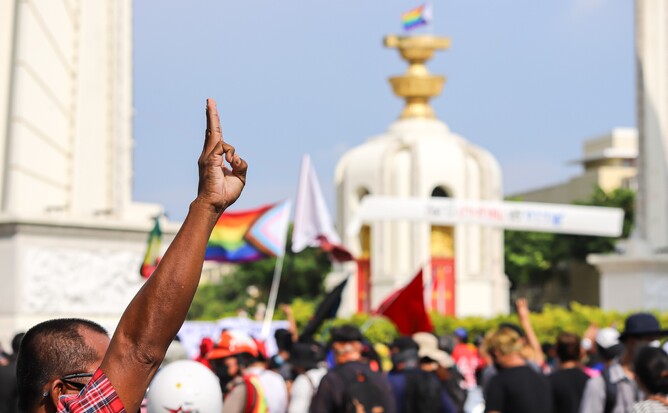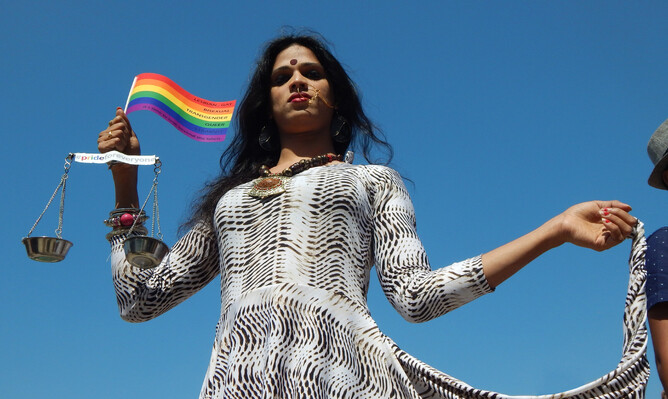Scholar-advocate Vinod Bal, co-founder of Adhikaar Aotearoa, explores the queer battles occurring in Asia’s courts. As he describes, there have been many triumphs throughout the years, tempered by some setbacks but.., "our people fight on".
OPINION: I was in Berlin in 2019. I was taking a human rights course that taught me my most important lesson about the law. “The law can have an immense emancipatory potential,” my teacher said. It's a sentiment that has stayed in my mind ever since. The word “can” is the most salient. Because the reality is, the law can be a force for emancipation, but it can also be a force for oppression.
This dichotomy is seen nowhere better than in the courtrooms of Asia.
In this setting, the battles for LGBTQIA+ rights are fought. In these settings, the entitlements, protections (if any) and mechanisms for accountability are set for the estimated 220 million LGBTQIA+ people who call Asia home. Finally, in these settings, battles for Asia’s soul occurs – one side reinforcing colonial puritanism, the other, our Asian history of sexual and gender diversity. This battle is playing out across the continent.
In July 2017, a court in Zhumadian, China, ordered a city hospital to publish an apology and pay compensation to a gay man who was forcibly admitted for “conversion therapy.” On the flip side, in March 2020, the Singapore High Court denied legal challenges against Section 377A of the Singapore Penal Code that criminalises consensual sex between men. The juxtaposition between the judgements is stark but indicative of the wider fight.
There was a time when LGBTQIA+ rights were not subject to a battle. Asian cultures have a vast and rich history of sexual and gender diversity. The Kama Sutra, an ancient Sanskrit text that was written over 2000 years ago, has a chapter dedicated to homosexual relations. In Japan, lesbian and gay relations were widespread across the Ashikaga and Edo eras. In Imperial China, many Han dynasty rulers were sexually diverse. Our continent has culturally specific LGBTQIA+ identities such as the Hijra of India and the Khwajasara of Pakistan.
Indeed, it was the imposition of colonial religiosity that changed a culture of acceptance and hospitality, into one of conservatism. It was the British who introduced section 377 to India in 1860. This section criminalised “carnal intercourse against the order of nature.” The British contended this included homosexual relations. In China, the term jijian, a contemptuous word that describes homosexuals, arose at the same time that Christian missionaries were stretching their arms across China. What Asia needs is a reclamation of its own history and that is what Asia’s courts are starting to provide.
Just a few days ago, the Kuwaiti Constitutional Court ruled that article 198 of the penal code which criminalised “imitating the opposite sex,” was unconstitutional. It held that this provision was a violation of article 30 of Kuwait’s Constitution that provides for personal freedom. While one may view this as simply a legal change, it should not be viewed in isolation. When a rule changes, so does the impact of that rule on marginalised communities. Article 198 of the penal code has previously been used to humiliate, persecute and abuse transgender women. In a Human Rights Watch report, one trans woman put it eerily well, the Kuwaiti Police use the article to “hunt us down for fun.” Indeed, this ruling is a step towards historical reclamation and emancipation.
In March 2021, the Sapporo District Court found that the denial of marriage to same-sex couples was unconstitutional. It declared that the deprivation of this right constituted “discriminatory treatment without a rational basis.” The Court posited that this denial violated the Article 14 of the Japanese Constitution that provides for the right to equality. While Japan’s Diet will need to be the body to institute same-sex marriage, this ruling, sends a tacit message of support to Japan’s LGBTQIA+ community, and reflects citizens’ opinions. 88 percent of the Japanese citizenry “agree or somewhat agree” with the introduction of anti-discrimination legislation; 80 percent support the passage of same-sex marriage. Such levels of support are not even seen in some of the “progressive” European countries. Indeed, queer/transphobia is not an Asian principle.
In September of 2018, the first of many legal successes occurred in India. With a sweeping judgement, the Supreme Court of India invalidated section 377 of the Indian Penal Code that criminalised same-sexual activity as an “unnatural offence.” Chief Justice Mishra, writing for the majority noted that section 377 is “manifestly arbitrary” and that it had become “an odious weapon for the harassment of the LGBT community.” Justice Malhotra, in her own opinion, was even more damning and posited that “history owes an apology to the members of this community and their families, for the delay in providing redressal for the ignominy and ostracism that they have suffered through the centuries.”
There have been many more wins. In Taiwan, same-sex marriage has been legalised making it the first Asian country to endow this right. Back in India, the Kerala High Court noted that “stringent action” should be taken against any forced conversion of the sexual orientation or gender identity of any person. These judgements take us a step closer to reclaiming our histories but to not acknowledge the detriments is to do a disservice to the LGBTQIA+ community of Asia. Legal setbacks have occurred across the continent.
In Kyrgyzstan, voters backed an amendment to the constitution to ban same-sex marriage, although there were widespread allegations of fraud. In South Korea, the Seoul Administrative Court found that an insurance provider who discriminated against a gay couple did so within the bounds of the law because the union of heterosexuals and the unions of homosexuals “fundamentally cannot be seen as equal.” Indeed, the worse setback for LGBTQIA+ rights in Asia occurred as the Taliban regained control of Afghanistan. A Taliban “judge” noted that “for homosexuals, there can only be two punishments: either stoning, or he must stand behind a wall that will fall down on him. The wall must be 2.5 to 3 metres high.”
I think my law teacher was partially right. The law can be a force for emancipation, it can be a force for good. We do not need to look far within the Asian LGBTQIA+ rights battle to see this. However, in the same vein, the law can be a force for oppression and for deep hatred.
Unfortunately, again, we do not need to look far within the Asian LGBTQIA+ rights battle to see this. Asian courts can reclaim our histories, they can reject legacies of colonisation and they can produce an interpretation of the law that is truly emancipatory. When they do so universally, maybe then my law teacher will be wholly right.
- Vinod Bal
This article is republished under Creative Commons and from the Asia Media Centre.

